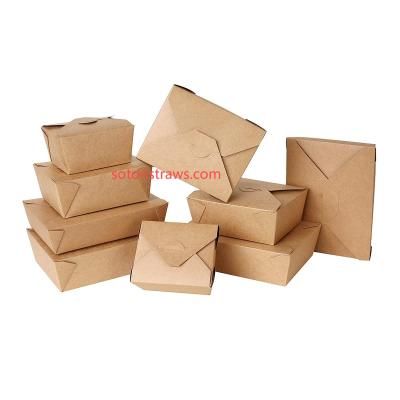Soton Engineers Tomorrow’s Recyclable Disposable Kraft Box
-
The rise of eco-conscious packaging has made the humble OEM disposable kraft box a symbol of sustainable food service. Yet beneath its natural appeal lies a complex engineering challenge: finding adhesives that securely seal containers while vanishing completely during recycling. Conventional glues often contaminate paper pulp streams, undermining the circular economy promise of these biodegradable boxes. This hidden dilemma separates truly sustainable solutions from superficial greenwashing in packaging design.
Food safety adds critical complexity. Adhesives must form impermeable seals against oils and sauces without transferring harmful chemicals to meals. Many industrial glues contain plasticizers or solvents that could migrate into food, especially when exposed to heat from freshly prepared dishes. Simultaneously, these chemical bonds must break down entirely when boxes enter recycling facilities. Traditional water-resistant adhesives typically fail this dual mandate—either compromising safety for performance or contaminating recycled paper outputs. The ideal solution requires adhesives engineered at molecular level to be inert during use but disintegrate on demand during pulping.
Recycling facilities face operational nightmares from adhesive contamination. Glue residues that don’t dissolve in water clog screens, coat machinery, and create defects in new paper products. Some adhesives even bind to paper fibers, reducing their quality and recyclability. This forces recyclers to downgrade material quality or reject entire batches, defeating the purpose of choosing kraft packaging. Truly recyclable adhesives must achieve complete solubility in standard pulping conditions without leaving microplastics or chemical residues. They should function like temporary bonds—strong when needed, invisible when discarded.
Material science breakthroughs now enable plant-based adhesive formulations. Innovations harness modified starches, cellulose derivatives, or natural rubber compounds that provide robust seals for hot/cold foods while remaining fully water-soluble. These avoid petroleum derivatives entirely, using non-toxic cross-linking agents activated by moisture cross-linking agents activated by moisture during recycling. Advanced formulations even adjust during recycling. Advanced formulations even adjust bonding strength based on temperature—firm during transport but dissolving rapidly in industrial pulpers. Such technologies transform the functional potential of disposable kraft box designs without ecological trade-offs.
Consumer education plays a vital role. Clear "Recycle Me" labeling should specify adhesive compatibility, while brands must communicate their packaging’s circular lifecycle. When customers understand their participation in the recycling chain—ensuring boxes enter proper streams—recovery rates improve dramatically. This collective effort maximizes the sustainability. This collective effort maximizes the sustainability impact of material choices.
Soton pioneers this holistic approach. Their disposable kraft box solutions feature proprietary bio-adhesives validated by recycling facilities worldwide. By integrating food-safe chemistry with zero-residue recyclability, Soton turns packaging into a genuine environmental asset rather than future waste.Click https://www.sotonstraws.com/product/biodegradable-straws/st101-paper-straws/ to reading more information.
